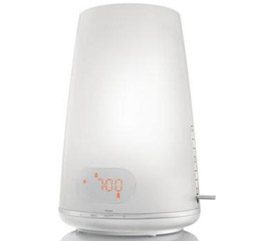Staff Tested: Philips Wake-up Light Plus Alarm Clock
Wake up naturally in a dark room with an alarm clock that simulates sunrise

Most Canadians rarely get up at sunrise-in winter, we tend to get up when it’s dark; in summer, good blinds are a necessity barring an extra-early wake-up call. Alarm clocks with built-in lights are designed to simulate sunrise with a gradual increase in light, so they help you wake up naturally, whether it’s pitch-dark outside or just in your bedroom.
The Pros
The Wake-up Light Plus gets brighter over a 30-minute period (or however long you set it for), and the light itself is quite bright and warm. We found it a pleasant experience to wake up to the light, especially with our own music programmed by inserting a USB key. It’s easy to use and looks good on a nightstand. And we love that you can also program “sunset,” to tell your body when it’s time to go to sleep (and to put the book away).
The Cons
While the buttons and programming are fairly simple to use, the button to turn the alarm on and off is a bit small to be easily found when you’re half asleep. Music and sounds added to the alarm via USB key are always played in the same order-a random feature would be nice; and even better, the ability to copy the songs to memory so the USB key doesn’t have to live in the clock.
The Verdict
If you have an easy time getting up with your regular alarm, this version is probably overkill for you. But anyone who struggles to get up in the morning, or whose snooze button is worn down from too much attention, will find the Wake-up Light Plus indispensible.
Philips Wake-up Light Plus HF3485 light therapy alarm clock
$179.99, at London Drugs and PersonalEdge.com (models and prices may vary)



